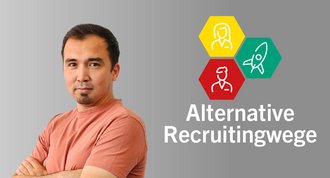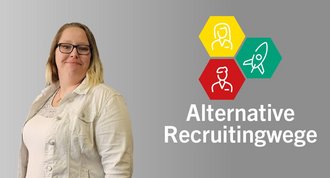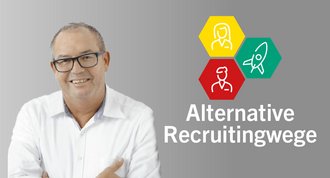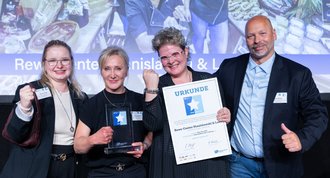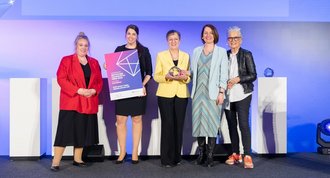
... and we want to prevent employees from leaving simply because they are unaware of these prospects: In future, changing careers internally should be more attractive and easier than hiring externally with the valuable expertise acquired over the years. To this end, we are currently setting up an internal job market for employees willing to make a change as part of the Step up cultural initiative with the GO! project. Find out all the details in the interview with project managers Franziska Halstrick and Christopher Ranft.
one: Franziska, Christopher, our topic is the internal job market as part of GO!, a new project within our corporate culture initiative Step up. Before we talk about the what, why and how of this tool, what is your respective connection to the topic?
Christopher Ranft: Franziska Halstrick and I are jointly responsible for the project. She is the Head of HR Development and I am the Head of Talent Acquisition within Retail Germany. And in this role, my team and I are able to support the GO! project for the entire Group.
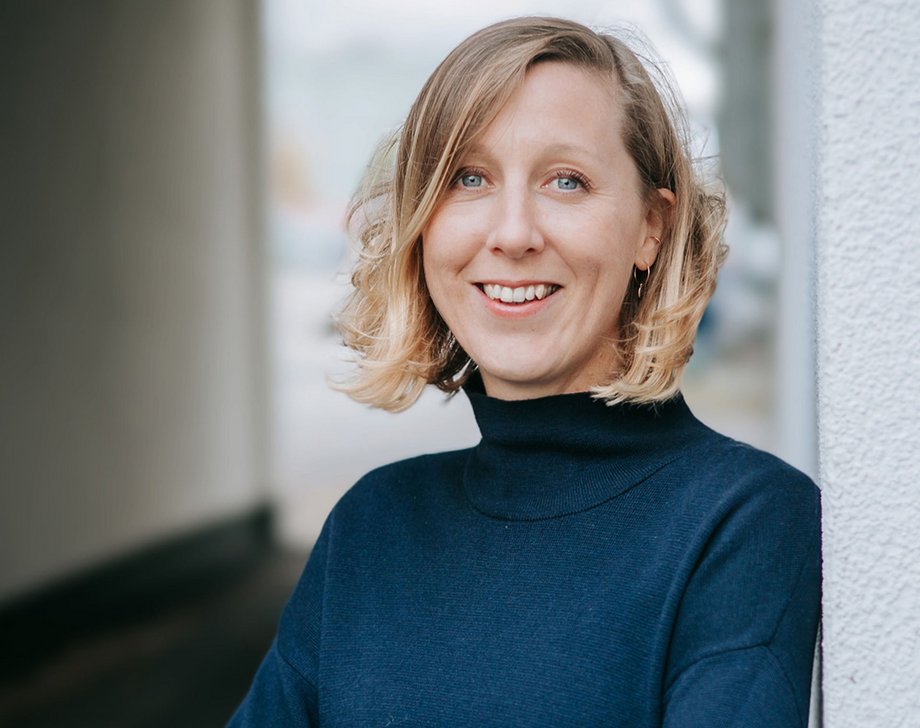 Franziska Halstrick
Franziska Halstrick: My connection to GO! stems from the Step up cultural initiative that we launched a few months ago. In this context, GO! is a very important component for me in supporting the willingness for change in our organisation and the employees' own initiative towards professional and personal development, as well as highlighting development prospects within REWE Group. I am driven by the question: How can we better retain employees today and in the future, how can we become more attractive as an employer?
Franziska Halstrick
Franziska Halstrick: My connection to GO! stems from the Step up cultural initiative that we launched a few months ago. In this context, GO! is a very important component for me in supporting the willingness for change in our organisation and the employees' own initiative towards professional and personal development, as well as highlighting development prospects within REWE Group. I am driven by the question: How can we better retain employees today and in the future, how can we become more attractive as an employer?
one: What is GO! and what was your aim in developing it?
Franziska Halstrick: GO! stands for Group Opportunities and is a project as part of the Step up cultural initiative, which aims to further develop leadership and cooperation in the direction of personal initiative and willingness to change. With GO! we want to demonstrate, among other things, that we at REWE Group value it when people have a positive attitude towards change and that we encourage this willingness to change. Both GO! and Step up are closely linked.
„It is strategically extremely important that we retain our employees.“ Christopher Ranft, Head of Talent Acquisition Retail Germany (HD)
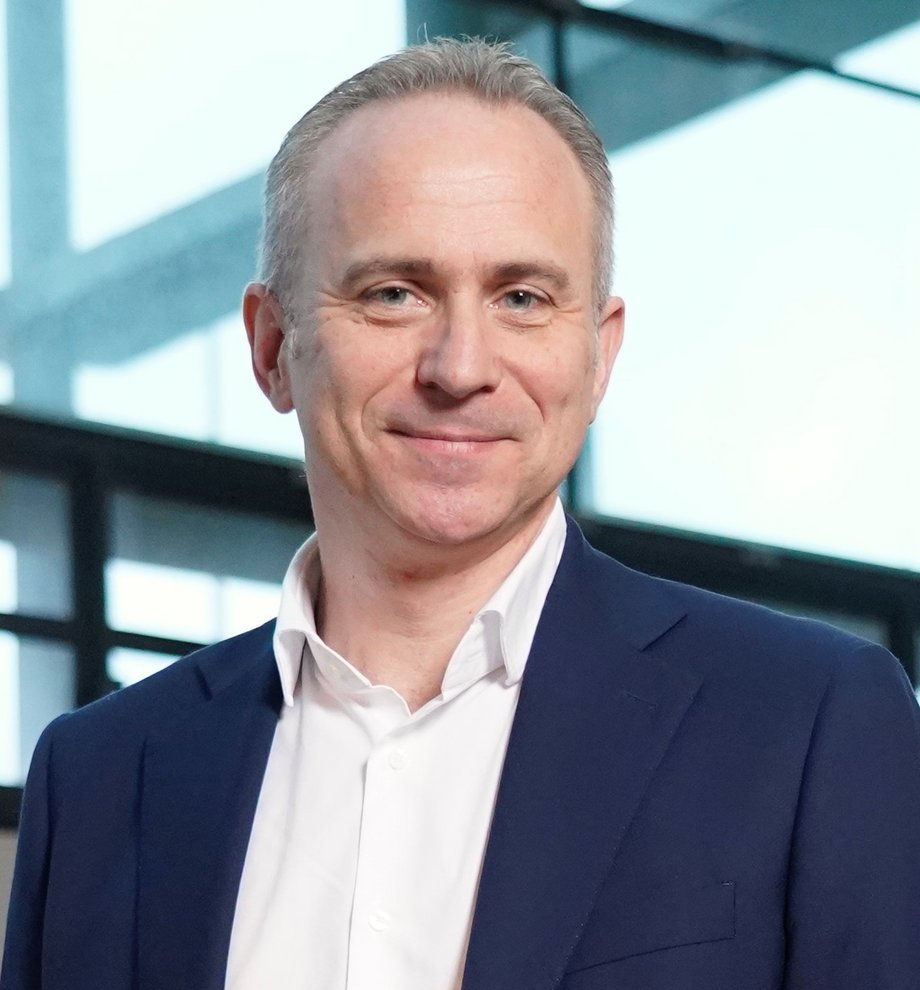 Christopher Ranft
Christopher Ranft: Step up is the overarching direction with which we are developing our management and collaboration culture in order to focus more strongly on the development of employees and offer them more prospects. This requires a well-functioning, Group-wide internal job market. And this is where GO! comes into play.
Christopher Ranft
Christopher Ranft: Step up is the overarching direction with which we are developing our management and collaboration culture in order to focus more strongly on the development of employees and offer them more prospects. This requires a well-functioning, Group-wide internal job market. And this is where GO! comes into play.
one: Why do we need to develop an internal job market?
Christopher Ranft: Demographic change is now clearly making itself felt and the labour shortage is palpable. Although we are still in a comparatively good situation at REWE Group, it is strategically extremely important that we keep our employees in the company and retain them. Because one thing is clear: staff turnover is something you can hardly afford these days.
We are large, diverse and offer a lot of opportunities and prospects - and we want to prevent employees from leaving us simply because they are not aware of these opportunities. That must not happen. That is why it is so important that we establish a well-functioning internal job market. Our aim is to make it more attractive and easier to move internally than externally. It is already more attractive today, but often not easier.
„With the GO! Talent Pool, we address employees who have shown a willingness to change in the STEPs dialogue.“ Franziska Halstrick, Head of Human Resources Development HD
one: GO! consists of several building blocks. Who is the GO! talent pool specifically aimed at?
Franziska Halstrick: We are targeting employees and senior managers from the entire REWE Group. We want to make it clear to employees what opportunities they have to develop themselves. With the launch of GO! Talent Pool, we are addressing those employees who have shown a willingness to change in the STEPs dialogue.
Senior managers, in turn, are addressed because they are responsible for the development of their employees. And in their role as senior managers, they themselves also benefit from an internal job market when they are looking for new employees.
Christopher Ranft: We are starting with a pilot group from Retail Germany, DERTOUR and toom. It is made up of the employees who are assigned to a talent pool as part of the STEPs interviews. Lekkerland will be added. In addition to the talent pool, there will be a #jobcompass and #jobtasting programmes to give employees better guidance on internal opportunities. We will then build up further building blocks, such as the initiative pool, at a later date, which we will communicate in more detail shortly.
one: How does the path to the GO! talent pool work in concrete terms?
Franziska Halstrick: The starting point is the STEPs discussion - STEPs stands for Strengths-Oriented Development Planning - which is designed as a dialogue about employees' strengths and professional and personal development. Development can take place in the current position, but both sides may also say that the next step could be further professional or disciplinary development within the Group, for example in a different area or business unit. The employee who is ready for change then "lands" in the talent pool.
Christopher Ranft: Anyone in the talent pool can be approached through internal sourcing. If a position is vacant and someone in the pool is potentially suitable, the sourcers approach this person. And this is cross-functional: sourcing is not just for your own business unit, but across all units involved in the pilot. In this way, we want to further strengthen the Group concept.
„We want to inspire those interested in change to stay and contribute the knowledge they have built up here.“ Franziska Halstrick, Head of Human Resources Development HD
one: Step up is also a leadership culture project. The path to the talent pool runs through the respective senior managers. However, not everyone wants to "give away" the best people. How do you argue here?
Christopher Ranft: Good people leave if a senior manager can't offer any prospects and there are no development opportunities in the department. This is where we come in with our arguments. It's not always easy, but it's imperative that we as an organisation live by this core principle: I develop for REWE Group and not just for myself alone..
Franziska Halstrick:...because if you want to change, you will change. And as long as external change is easier than internal change, the person will leave the company and take their knowledge elsewhere. That's not how we want to operate, we want to inspire those interested in change to stay with REWE Group and contribute the knowledge they have built up here.
Christopher Ranft: As a senior manager, it makes no difference whether you lose employees internally or externally, but as a Group as a whole we have a loss. So if you look at it from a Group perspective, you realise that it's better for employees to stay rather than go to a competitor. And, of course, the talent pool is also open to senior managers who have "given up" employees and are now looking for replacements.
one: What are the advantages of an internal job market?
Christopher Ranft: Someone from within knows the company, its informal culture and the processes. This knowledge, which you can't read up on anywhere but only acquire on the job, is not lost when you move internally. Just like the network within the company that has been built up over the years and guarantees a short line of communication when it comes to solving problems. You take these contacts with you to your next job. We all benefit from that. These are just two of many good arguments.
„My vision? An internal job market becomes a matter of course and it is very easy to switch internally.“ Christopher Ranft, Head of Talent Acquisition HD
one: What does the Talent Pool offer employees?
Christopher Ranft: The talent pool offers the prospect of further development. However, this also requires initiative, courage and a willingness to find out more. I don't want GO! to be misunderstood as a pool where I sit and wait for someone to call me at some point. I also have to get involved myself. What's more, we won't be able to contact all employees - purely for capacity reasons.
one: Franziska, where will we be with our talent development in about ten years' time, what impact will GO! have on the corporate culture?
Franziska Halstrick: We are undergoing a process of cultural change. Many senior managers already have a cooperative and development-orientated management style. However, we want to give all employees the opportunity to become visible. This is why, in addition to the talent pool, there is an initiative pool for all those whose interest in change is not channelled through senior managers or who are not currently registered for the pilot project.
In our vision, the initiative pool will no longer be needed in ten years' time because the relationship between senior managers and employees will allow open dialogue about change requests at any time. Changes across divisions and business units have become the norm.
one: Christopher, what will the internal job market look like in a few years' time?
Christopher Ranft: My vision is that an internal job market will be a matter of course. And that it will be very easy to switch internally. The internal job market will become increasingly important compared to the external one, and the more cross-divisional it is, the better. For example, switching from retail to Travel and Tourism or from Germany to abroad. If we manage this cultural change even better, then I would be happy.
one: Where should we start in terms of cultural change?
Franziska Halstrick: For me, it's a holistic approach. That is also the reason why we have launched so many initiatives. STEPs and GO! are just one part of it. With both, we have programmes for employees and senior managers to deal with these cultural issues, such as development and willingness to change. We have also created qualification programmes for senior managers to enable them to do this, and we never tire of communicating our ideas about Step up time and time again. All of this together will help us to achieve this vision in the long term.
one: Franziska, Christopher, thank you for talking to us.
Christopher Ranft is responsible for Talent Acquisition Retail Germany.
Franziska Halstrick is responsible for Human Resources Development Retail Germany
You can also find more information on the individual GO! modules on your intranet.

